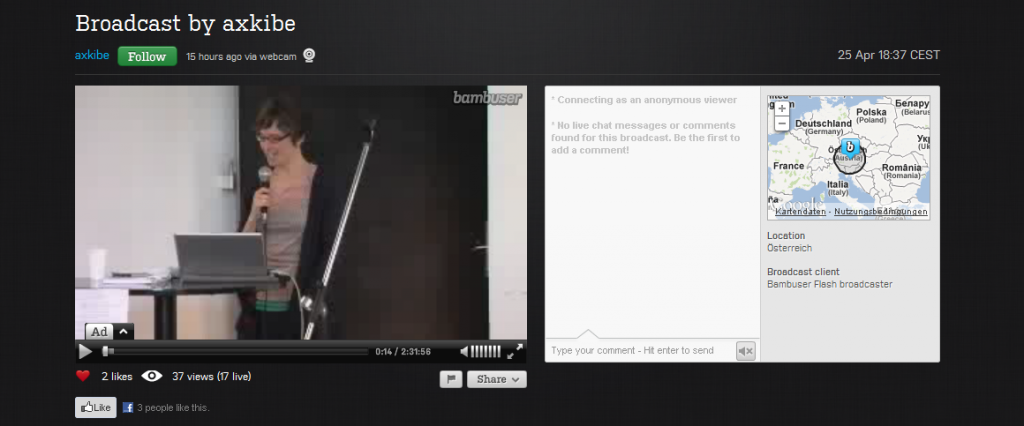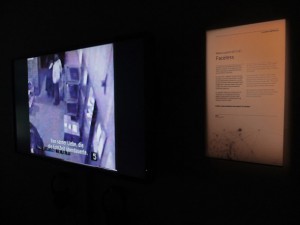I’m already looking forward to the event “Black Box Suchmaschine. Google & co. im gesellschaftspolitischen Kontext” I’m organizing together with René König (in cooperation with our research group Internet Research).
Here’s the abstract & the program featuring great speakers!!! (in German)
Termin: 25.04.2012, 18.30
Ort: Museumsquartier Wien, Raum D
Zudem Online-Anbindung durch Streaming und/oder Microblogging.
(Image credit: Anja Goller. Something interesting..)
Suchmaschinen wie Google prägen das Netz wie kaum ein anderer Dienst. Zwar gewinnen soziale Netzwerkseiten wie Facebook zunehmend an Bedeutung, doch werden Nutzungsstatistiken noch immer von Suchmaschinen dominiert. „Googeln“ ist eine alltägliche Praxis geworden, die nur selten hinterfragt wird. Dabei strukturieren Suchmaschinen unseren Zugang zu Netzinformationen maßgeblich. In der Privatwirtschaft ist diese Erkenntnis längst etabliert und Firmen geben viel Geld für sogenannte Suchmaschinenoptimierung aus. Aus gutem Grund, denn bisherige Nutzungsforschung zeigt deutlich, dass mehrheitlich den hierarchischen Ordnungen der Ergebnislisten gefolgt wird. Gleichzeitig wird dabei häufig eine fragwürdige Datenpolitik betrieben, die immer wieder für Kontroversen sorgt. Erst kürzlich hat sich etwa Google mit seinen geänderten Nutzungsbedingungen wieder ins Zentrum des öffentlichen Interesses katapultiert. Denn seit März müssen angemeldete NutzerInnen zustimmen, dass das Unternehmen umfangreiche User-Daten aus seinen verschiedenen Diensten (dazu gehört nicht nur Google Web Search sondern auch beispielsweise Google Maps, Google Mail, YouTube, Google+ uvm.) zusammenführt, was DatenschützerInnen auf die Barrikaden steigen lässt. Entsprechend kommt Suchmaschinen wie Google eine erhebliche gesellschaftspolitische Bedeutung zu, mit der sich unser Themenabend „Black Box Suchmaschine“ aus unterschiedlichen Blickwinkeln auseinander setzen möchte. Dazu geben WissenschaftlerInnen Einblicke in aktuelle Forschungen, die wir zur Diskussion stellen wollen. Schließlich wird im Anschluss das Netzwerk „[Re]Search“ gegründet, an dem sich alle Interessierten beteiligen können.
Programm
18.30 Begrüßung
18.35 Keynote:
Asymmetrische Beziehungen – Klassifizierungskämpfe in Informationsgesellschaften
Konrad Becker
Institut für neue Kulturtechnologien & World-Information.Org (Wien)
18.50-19.30 Block 1: Wie Suchmaschinen unser Wissen gestalten
Ganz persönlich? Alte und neue Soziometriken der Suchmaschinen
Katja Mayer
Universität Wien, Wissenschaftsforschung
Das suchende Individuum – Subjektive Perspektiven zwischen globalen Strukturen und Personalisierung
René König
Karlsruher Institut für Technologie
Vertrauen, Diversität und Empfehlungssoftware
Judith Simon
Universität Wien / Karlsruher Institut für Technologie
19.30-20.10 Block 2: Wie Google & co. mit unseren Daten Geld verdienen
Suche und Werbung: Fundamentale Interessenkonflikte im Google-Empire
Bernhard Rieder
Universität Amsterdam
Suchmaschinen im Spannungsfeld von globaler Informationsökonomie und lokaler Gesellschaftspolitik
Astrid Mager
Österreichische Akademie der Wissenschaften
Auf der (Web-)Suche nach der informationellen Selbstbestimmung – Privacy by Design als Regulierungsansatz?
Jaro Sterbik-Lamina, Stefan Strauß
Österreichische Akademie der Wissenschaften
20.10 Podiumsdiskussion
Moderierte Podiumsdiskussion mit Publikumseinbindung (auch online) zu quer liegenden Fragen der präsentierten Themenschwerpunkte. Anschließend Gründung des Netzwerks [Re]Search für alle Interessierten.
 Thanks to Axel Kittenberger for the technical support & the stream! & everyone, who participated and made this evening a great contribution to the politics of search, modes of ordering knowledge, privacy and regulation (which triggered a heated debate, as you can see towards the end of the video)..
Thanks to Axel Kittenberger for the technical support & the stream! & everyone, who participated and made this evening a great contribution to the politics of search, modes of ordering knowledge, privacy and regulation (which triggered a heated debate, as you can see towards the end of the video)..




